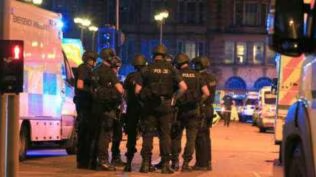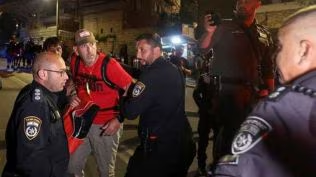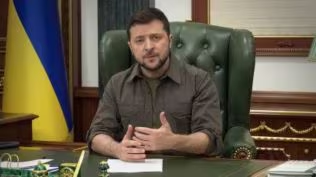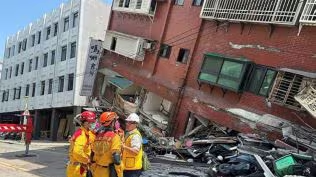Iranian embassy attack in Syria: Five questions answered
What exactly happened in Damascus?
On Monday, April 1, an explosion hit a building on the busy Fayez Mansour Road in the western Mezzeh district of Damascus— the consulate of the Iranian embassy in the Syrian capital. The building was completely destroyed. According to the latest reports, at least 13 people were killed, among them two high-ranking members of Iran’s Revolutionary Guards: Mohammed-Reza Zahedi, a commander in the Quds Force, and his deputy, Mohammed Hadi Haji-Rahimi. Zahedi was said to have been particularly closely connected to the Hezbollah leader Hassan Nasrallah.
The building was also the residence of the Iranian ambassador to Damascus, Hossein Akbari. He survived the explosion, as he was in the adjacent embassy building at the time of the attack. According to Akbari, six rockets fired from F-35 fighter jets hit the consulate building in quick succession. The Syrian defense ministry, meanwhile, said aircraft had fired missiles from the Israeli-occupied Golan Heights.

What is the Quds Force?
The attack is a severe blow for Iran. The Quds force is an elite unit of Iran’s Revolutionary Guards (IRGC), specializing in foreign deployments. Officially, it numbers around 5,000 fighters and answers directly to the Supreme Leader, Ayatollah Ali Khamenei. The Quds Force was founded in the early 1980s, during the Iran-Iraq war, to actively spread the goals of the 1979 Islamic Revolution throughout the Muslim world.
“Al-Quds” is the Arabic name for Jerusalem, and it is certainly intended to reflect the aims of the group: The conquest of the city, which Muslims, Jews, and Christians all regard as holy, is one of principal long-term goals of the organization. To this end, the Quds Force collaborates with other radical Islamist, anti-Israel organizations like the Palestinian Hamas, or Hezbollah in Lebanon. Like these, they are classified by the United States as a terrorist organization. However, the Revolutionary Guards have not yet been put on the European Union’s list of terrorist groups. Senior members of the Quds Force are, among other things, regularly active as “military advisors” in Iraq, Syria, and Lebanon, where they coordinate military and paramilitary organizations, thus increasing Tehran’s influence in these countries.
How have Syria and Iran reacted?
Iran’s Supreme Leader Khamenei and the Iranian president, Ebrahim Raisi, blamed Israel for the airstrike, and have threatened to retaliate. In a statement issued by his office, Raisi declared that the “cowardly crime” would “not go unanswered.” He condemned the attack in Damascus as an “inhuman, aggressive, and despicable act of invasion” and a “blatant violation of international rules.” Hezbollah in Syria also declared that the airstrike in Damascus would “not pass without the enemy receiving punishment and revenge.”
Several other Arab states, as well as Russia and China, all condemned the attack, and emphasized that the security of diplomatic facilities must not be violated. The UN Security Council held an emergency public session on Tuesday, at Russia’s request, to discuss the attack.
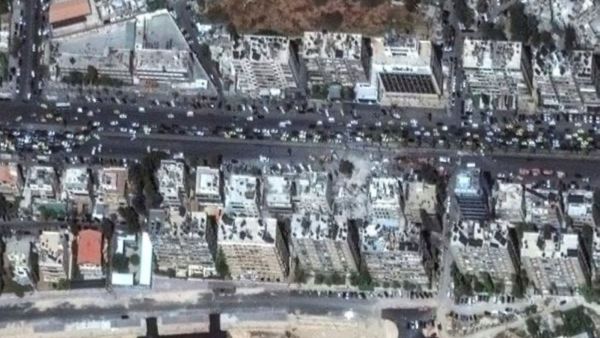 A satellite image shows the Iranian embassy and consulate following a suspected Israeli strike, in Damascus, Syria. (Reuters Photo)
A satellite image shows the Iranian embassy and consulate following a suspected Israeli strike, in Damascus, Syria. (Reuters Photo)
Why is Israel increasingly attacking targets in Syria?
As a rule, the Israeli army does not comment on attacks in Syria, and so far has not made any statement about this one. However, the Israeli air force does often bomb targets in Syria and Lebanon, with the aim of reducing Iran’s growing military influence there. These attacks have increased in frequency since the start of the Gaza war six months ago. On Sunday, the Israeli army fired four rockets at a military research facility just outside Damascus. Just two days prior, more than 50 people were killed in heavy airstrikes in the province of Aleppo, in north-western Syria. They were said to have been mostly Syrian military personnel and members of Hezbollah militias.
Israel and its allies have also repeatedly carried out targeted killings of senior members of the Quds Force. A drone strike by the US Army four years ago that killed the organization’s leader, Qasem Soleimani, attracted considerable attention. However, the recent suspected airstrike in Damascus is especially sensitive because it targeted an Iranian embassy building — which, legally, is Iranian soil.
How likely is further escalation?
Among the reactions from Tehran, voices are increasingly heard that refuse to rule out a military response. “The Islamic Republic of Iran reserves its legitimate and inherent right under international law and the United Nations Charter to take a decisive response to such reprehensible acts,” wrote Zahra Ershadi, Iran’s ambassador to the UN, in a letter to UN Secretary-General Antonio Guterres just hours after the attack.
In a thread on the social media site X (formerly Twitter), Hamidreza Azizi, a visiting fellow at the German Institute for International and Security Affairs (SWP) in Berlin, said that this attack marked “a significant escalation in tensions” between the two countries.
Azizi said that the recent attack in Damascus “is viewed by some in Iran as a declaration of war by Israel against Iran.” He himself observed a “shift” in the choice of targets by the Israeli army. In the past, he said, the army had avoided direct confrontation with Iranian targets — but since the start of the current war in Gaza, Israel had increasingly targeted high-ranking Iranian commanders in the states it borders.
However, the Iranian-born political scientist believes that Iran now faces a dilemma. A failure to respond could, he suggests, significantly weaken Iran’s position with its allies, and expose its armed forces and commanders to further attacks. Tehran may, therefore, feel compelled to respond militarily: The question is how, where, and to what extent.
Disclaimer: The copyright of this article belongs to the original author. Reposting this article is solely for the purpose of information dissemination and does not constitute any investment advice. If there is any infringement, please contact us immediately. We will make corrections or deletions as necessary. Thank you.
